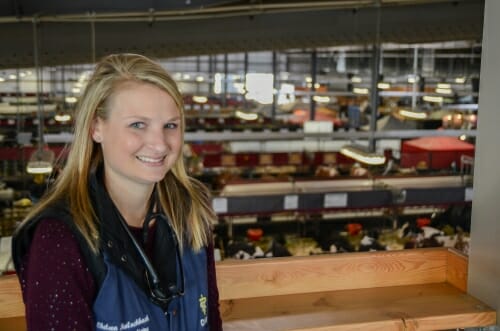New Faculty Focus: Chelsea Holschbach

Chelsea Holschbach
Chelsea Holschbach: clinical instructor in Large Animal Internal Medicine, Department of Medical Sciences, School of Veterinary Medicine
Hometown: Baraboo, Wis.
Educational/professional background: Having grown up on a Wisconsin dairy farm, I aspired from a young age to become a large animal veterinarian. In order to pursue these aspirations, I studied Dairy Science at UW–Madison prior to acceptance into veterinary school in 2010. Following graduation, I completed a Food Animal Medicine, Surgery, and Field Services internship at Colorado State University. I returned to Madison in 2015 for a dual Large Animal Medicine residency and Masters program. In 2019, I completed my MS in Dairy Science and obtained board certification by the American College of Veterinary Internal Medicine. I then became a Clinical Instructor in Large Animal Medicine at the UW-Veterinary teaching hospital.
How did you get into your field of research? I have always taken a special interest in dairy calves. During my veterinary training at UW, I was fortunate enough to work with some of the experts in the field of dairy calf health who helped spark my interest in research. As a graduate student, my research focused on respiratory disease in preweaned dairy calves, and using lung ultrasonography to diagnose pneumonia and monitor response to treatment.
What attracted you to UW–Madison? The UW School of Veterinary Medicine has the reputation of being one of the most elite food animal hospitals in the county. Given my career interest in dairy cattle and the proximity to my family, Madison was the perfect fit.
What was your first visit to campus like? My parents and sister graduated from UW–Madison, so I’ve spent a lot of time on campus prior to my own schooling. One of my earliest memories was attending a dairy cattle sale at the stock pavilion and eating Babcock ice cream.
What’s one thing you hope students who take a class with you will come away with? Since most of my teaching takes place in the clinical setting, I want students to know that “animals don’t always read the book”, a.k.a. making a clinical diagnosis is often not as straightforward as it may seem.
Do you feel your work relates in any way to the Wisconsin Idea? Absolutely! Large animal veterinarians, namely those who work with production animals, have a huge responsibility to help ensure an abundant and safe food supply. Research being conducted by faculty at the UW-SVM is helping to increase animal productivity, improve animal welfare, and decrease the use of antibiotics.
Hobbies/other interests: Anything related to Holstein cows or Green Bay Packer football!




